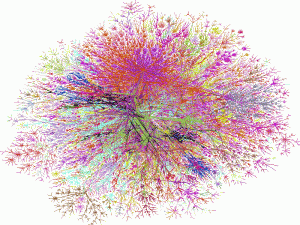The warning signs have been ignored for a long time: news media are endangered and are losing ground against propagandists in the digital world.
Well before Pegida aficionados started to chant “Lügenpresse” (“lying press”) in German streets, the loss of trust in journalism had become obvious. However, the accusation is misleading. Only very few newsrooms spread hoaxes on purpose. The allegation “lying press” is itself a lie. Whoever adopts such Nazi jargon inevitably paints things black and white, where shades of grey would be more appropriate. There are other reasons why we seem to have arrived in “a post-fact era” as Angela Merkel, the German chancellor, recently stated.
The ‘attention economy’ is rapidly transforming itself into a misinformation economy in which it is profitable for some players to use widespread lies, conspiracy theories and other propaganda, especially through social media. This article summarises recent media research findings which reveal the risks and collateral damage of modern communication technologies.
A deterioration of trust in the media
Many media professionals only became aware of the precarious situation of journalistic credibility after the New Right started campaigning against mainstream media. In German-speaking countries journalists and media managers have persistently ignored what researchers have been stating for decades: that there is a deterioration of trust in the media. It is related to power shifts between journalism, PR and propaganda, but also affected by the echo chambers of social media where propaganda spreads quickly. Algorithms and robots, the so-called ‘social bots’, feed and intensify this process while chances to counter the trend by fact-checking and ‘enlightenment’ are diminishing.
Alarm bells should have been ringing since the 1960s, when the German public broadcasters, ARD and ZDF, began a long-term study which measured the state of media credibility every few years. Again and again, the published data showed a decline in trust in the media. Similarly, decades of surveys reveal the professional reputation of journalists has stayed low.
Looking back, all of this seems strange: While many newsrooms are experts in ‘outrage communication’ and transforming molehills into mountains, many closed their eyes to the problem, which threatens their own existence as much as our democratic societies.
Researchers not only provided alarming data, they also delivered a concept for analysing and interpreting it. Around the turn of the 21st century, and quite a while before the internet and digitalisation disrupted media industries, the Austrian social scientist Georg Franck published his book about the ‘attention economy’. He showed how growing competition for public attention between institutions, including politicians, CEOs, sports stars and other VIPs, has been changing society.
Franck argued that material capitalism is transcending into a “mental capitalism” with “bizarre, clownish traits”. He presented a second economic circuit, which progressively replaces the traditional exchange of goods and services for money. According to Franck, under conditions of growing wealth and saturation of material needs, more and more news/information is exchanged for public attention/visibility.
As public attention is scarce and can be turned into money or power, more money is invested to generate it. In this way we can plausibly explain why in the US nowadays there are five PR experts for each journalist, whereas thirty years ago this ratio was approximately 1:1. With the dominance and the professionalisation of the PR sector, copy-paste journalism has spread rapidly, and this has, step by step, undermined journalism’s credibility.
Uwe Krüger (University of Leipzig) shows, in his award-winning book Mainstream, how under these circumstances German news media converged into an elusive red-green (Socialists and Greens) consensus, and how eventually even the journalistic followers of Merkel’s Christian Democrats came under this red-green umbrella.
‘Elitist’ newsrooms are ignoring whatever they deem ‘politically incorrect’
Key terms, according to Krüger, are “multiculturalism and diversity, cosmopolitanism and tolerance, equal rights for and protection of minorities, anti-discrimination and gender mainstreaming”. At the same time, Krüger suspects that, “whatever, in this sense, is not ‘politically correct’”, is being refused and fought as newsrooms don’t differentiate enough between the “relatively few right-wing extremists and the relatively many with right-wing leanings”.
According to Krüger, many journalists are embedded in elite networks. Therefore, the public has accumulated a considerable amount of “rage of disappointment” over the last few years. The media seem “to be more the lapdog than the watchdog of the government, and no longer an advocate of the governed”, Krüger says. He also explains how a “pedagogic-paternalistic attitude” of the media has ended up as a “perceived control” by the recipients.
However, all of this does not yet explain how the attention economy is turning into a disinformation economy. For some players – for example politicians such as Donald Trump and Vladimir Putin, even some businesses and non-profit organisations – there is some value in false or exaggerated news. For some players, half truths and propaganda add up to useful attention.
Journalists are no longer the gatekeepers of public discourse
Even on the internet the mainstream mass media have remained the leading providers of news. However, due to the collateral effect of the digital revolution, journalists have lost their role as dominant gatekeepers of public discourse. The public’s willingness to pay for news media diminished, advertising revenues which financed newsrooms shrank rapidly and mostly now reaches Google’s or Facebook’s bank accounts.
This makes it possible for an increasing group of highly professional spin doctors, as well as naive citizen journalists and trolls (among them not only humans. but also robots), to flood the news with purposefully targeted misinformation.
Whether the topic is chemtrails or vaccines, climate change denial, the US presidential campaign, the Crimean occupation, fascists in Ukraine, IS terrorism, or tobacco, sugar or drug abuse – false information is spreading on the web.
Tech company algorithms are distributing conspiracy theories
The algorithms of Google, Facebook and Twitter are distributing and multiplying conspiracy theories, and they are also creating the filter bubbles in which misinformation and urban myths are circulating within the social media. In a big data project, an Italian team of researchers (among them Micaela Del Vicario, Fabiana Zollo and Walter Quattrociocchi of IMT School for Advanced Studies, Lucca) compared Facebook accounts in the US and Italy – distinguishing accounts which are providing well-researched information (checked either by professional journalists or scientists), and those ‘link slings’ which are multiplying misinformation. Their disquieting conclusion is that due to the ‘likes’ and ‘shares’ of users and social bots, fakes and nonsense are spreading in the filter bubbles of social media much faster, and covering larger areas, than the objectively considered news provided by ‘serious’ sources.
The role algorithms play in this dissemination process is the best kept secret of the internet giants which have already grown into huge global media companies – obviously without taking any editorial responsibility for the nonsense they are multiplying on their platforms. Frank Pasquale, the American law professor (University of Maryland), speaks of a “Black Box Society” in which we increasingly seem to live.
A significant percentage of social media accounts are believed to be ‘social bots’
Algorithms are replacing journalists and social bots are substituting for real trolls. On behalf of their employers/operators, they influence public opinion in the web using fake accounts on social media platforms where they foment hatred and distrust with thousands of varied comments, but especially by ‘likes’ and ‘shares’ which make algorithms spread their messages on the web, supporting swarm foolishness and discouraging swarm intelligence.
Simon Hegelich, the German political scientist and IT expert (Technical University of Munich), recently showed a conference of Austrian publishers how easy this is: 10,000 Twitter accounts are available for US$ 499. To provide these accounts with artificial intelligence is cheap, too. Hegelich estimates that a notable percentage of all Twitter users could already be social bots, and this number is likely to grow. Facebook estimates that there are around 15 million bot accounts active globally. Without any question, social networks are turning into the ideal breeding ground for any kind of propaganda, given that the use of robots is risk free, and their operators very hard to trace.
Last but not least, the success of authoritarian leaders such as Putin or Turkey’s Recep Tayyip Erdogan in stabilising their rule of power might be explained by the way they are increasingly taking over the media space. They constantly control it by intimidating journalists and bringing media organisations under the control of friendly oligarchs and promoting themselves through social media.
Investigative journalists who try to uncover the Kremlin’s troll-spook game, as for example Jessikka Aro in Finland, or the German TV journalist Hajo Seppelt – who analysed in-depth the Russian doping scandal – have to be prepared to face storms of protest on social media.
By now, western populists such as Donald Trump, Frauke Petry or Christoph Blocher appear to imitate the Putins and Erdogans of this world. In fact, even those journalists who strongly oppose and represent the ‘lack of alternative’ mainstream consensus, are themselves manipulated by right wing propaganda if they inflate each little provocation into a top story.
Walter Quattrociocchi’s research team leaves no doubt that all attempts by fact checking websites, or clarifications by the ‘serious’ media, to counter the disinformation flood are unhelpful, as they are unable to reach out of their own social media filter bubbles.
This article was first published in NZZ and has also appeared on the German EJO
Pic credit: Internet ‘splat map’ Steve Jurvetson CC Flickr licence
Sources
Uwe Krüger (2016): Mainstream. Warum wir den Medien nicht mehr trauen, München: C.H. Beck
Micaela Del Vicario et al. (2015): The spreading of misinformation online, in: PNAS Vol. 113, No. 3, Jan. 19, 554-559
Frank Pasquale (2015): The Black Box Society, Cambridge MS/London: Harvard University Press
Fabiana Zollo et al. (2015): Debunking in a World of Tribes, in: arXiv: 1510.04267 vl v. 14. Oct.
https://arxiv.org/abs/1510.04267
Tags: algorithms, digital, Facebook, Google, lies, lugenpresse, Media research, Misinformation, Pegida, Propaganda, Research, social bots, Social media













































